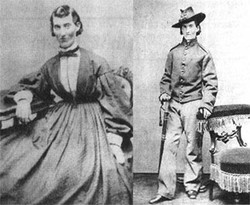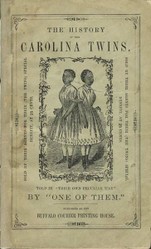America The Story of Us - 5 US History Facts I learned From This Show
by Bcarter
I watched "America, The Story Of Us" this weekend and once I started it while I was awake, I just couldn't stop watching it. The cool thing was, I learned some things too.
Do You Know Little Details About US History?
Yesterday, I found 12 hours to watch the entire series called "America: The Story of Us" which aired on the HIstory Channel in 2010. I didn't solely watch the series, sometimes it was just background noise, but I was able to catch the jist of the entire series and stop what I was doing when I heard something that I didn't know about.
If you are looking for a series about the deepest and darkest parts of US history, then this series is not for you. It is mainly a general timeline of the major events in US history. The series is kept interesting for those of us who are knowledgeable of our history by spattering in small tid bits about real people or interesting facts that maybe we didn't know.
I've made a list of 5 things that I learned from the series: America, Story of Us. I hope you check out the series and learn something as well.
Buy America: The Story of Us
 |  |  |
| America: The Story of Us (Limited Edi... A&E Television Networks Only $41.99 | America: The Story of Us [Blu-ray] A&E HOME VIDEO Only $41.0 | America: The Story of Us A&E HOME VIDEO |
Fun Fact 1: The Statue of Liberty was shipped in pieces and almost wasn't erected in New York.
I'm not sure why this surprised me, but did you know that the Statue of Liberty was shipped to the United States in 350 pieces? It arrived and then New York didn't have the money to put it together. So Joseph Pulitzer put together a newspaper campaign to raise the funds to assemble it in New York. People sent in their pennies, nickels, dimes, and dollars from all over the country and in the end raised $121,000 which was more than enough to assemble the statue in New York City where he felt it really belonged. There were 6 other cities fighting for the right to errect the statue in their city.
Fun Fact 2: One Third Of The Population Of Norway Immigrated To The United States Between 1825 and 1925
I had no idea that Norway lost one third of their population to the United States between 1825 and 1925. I was aware the Norweigian immigrants where numerous, but I guess I didn't realize it was that many of them. They settled mainly in the upper Midwest where they were able to get land for a relatively cheap price and contributed a lot to the logging industry which fueled the growth in the Great Plains.
Fun Fact 3: George Washington Vaccinated For Small Pox At Valley Forge
The winter at Valley Forge was not a fun one, clothing was scare, food was scarce and on top of it all, the soldiers were hit with an outbreak of Small Pox. The vaccines were not official shots and it was a long shot for Washington, but it worked.
While the white man brought Small Pox to the North American continent and nearly wiped out the American Indians with it, since it had been 3 or 4 generations since they had been exposed to the disease, the colonists were susceptible to it again.
Washington remembered that he had Small Pox as a child and started a make-shift vaccination program. They would cut the soldier's skin and then take the puss from an infected soldiers postules and rub it on the open wound. While it's not clean like the vaccinations of today, it's the same idea. It worked as well, the outbreak was contained.
This idea didn't come without a price, about 1 in 50 soldiers died from the vaccinations because their immune system couldn't work fast enough to build up the antibodies to fight off the disease.
Fun Fact 4: 11,000 Revolutionary War Soldiers Died On British Prison Ships
Ok, this fact really isn't fun, but it's something that not many people are aware of. If you were a revolutionary war soldier, you would be better off dying than being taken prisoner by the British.
They had a policy of holding POW's on ships in the harbor of New York City (an others, but there were a lot more in NYC) where more than 3/4's of the men died from either starvation, disease, or torture. The British had an unspoken policy of disposing of POW's instead of just holding them.
Fun Fact 5: It Was Just As Dangerous To Work In An Artillery Factory As It Was To Be In Battle
This isn't really a fun fact either, but it's something to be aware of. Making the artilary for WWII was just as dangerous as using it. If you were a woman working in a munitions plant, you didn't dare comb your hair on the line where the add the magnesium powder because even the slightest strike of static electricity could set the powder off.
America: The Story of Us In Conclusion
I was originally going to include 10 facts that I learned from the series, but I didn't want to ruin it for history buffs that may want to spend some time watching it.
I think the entire series is geared towards the Americans that have a short attention spand or teenagers. It is not meant to be an entire comprehensive history of the United States, if it was this series would take another 10 to 20 years to make and they still wouldn't be able to cover everything.
The one thing I did not like about the series was the fact that some entertainers were included speaking their piece about US history. Margaret Cho was a stretch being included because she is the daughter of Chinese immigrants, but including Sheryl Crow stating her piece on US history really wasn't necessary. I think this was just the producer's way of getting their series to appeal to the masses.
Ok, there was one more thing that I didn't like about this series and that was the fact that WWI was skipped entirely. This war lead to a lot of the prosperity of the 1920's and should have been at least mentioned.
If you are a history buff, don't expect the major events in this series to be anything new to you, but watch for the details, that's where you will learn something.
You might also like
The Women Who Fought in the American Civil WarWhen we imagine the heat and blood of Gettysburg, it's the men that we see st...
The Carolina Conjoined Slave Twins Born in 1851In 1851 children who were born ill or with special needs seldom survived. Con...





 Why Do You Write?on 06/07/2011
Why Do You Write?on 06/07/2011


Comments
History was always my favorite subject in school. I loved learning about American History.